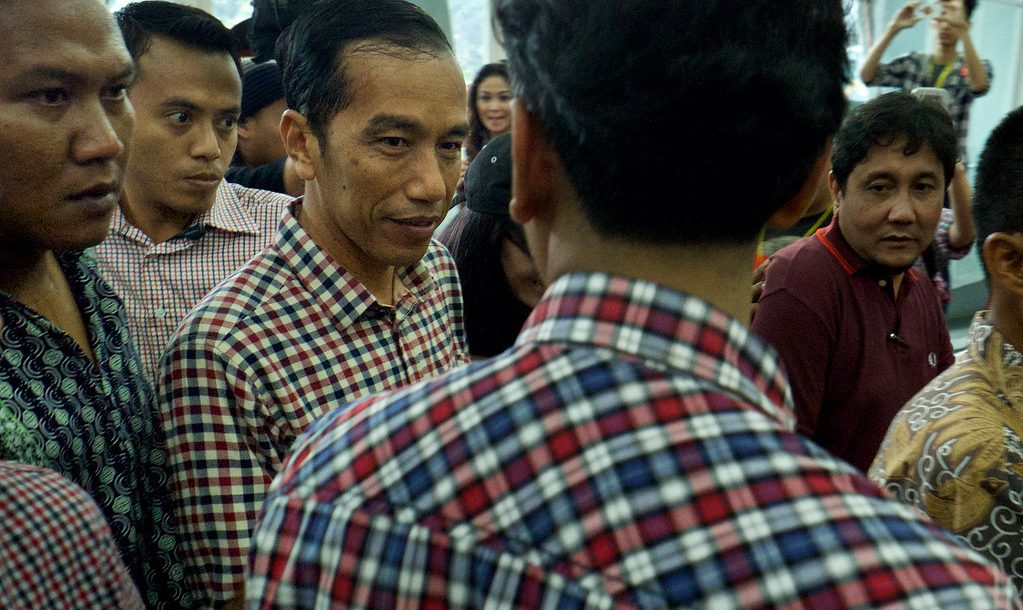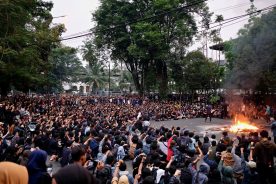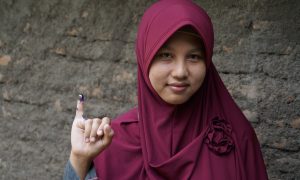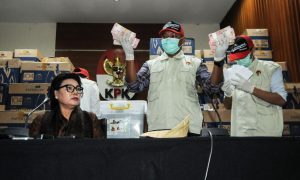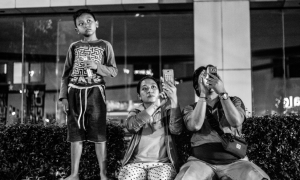Indonesia’s 2019 elections confirmed both the country’s status as a competitive electoral democracy and the trend of decreasing democratic quality. In this article, we investigate this seemingly paradoxical pattern by highlighting four political arenas directly associated with the elections. First, the incumbent government’s failure to secure a larger margin of victory for President Jokowi highlights the continued competitiveness of the electoral system, despite attempts to use state agencies for the president’s re-election campaign. Second, although efforts to mobilise state resources for Jokowi were largely unsuccessful, they added to an already significant illiberal shift. Third, the elections further accelerated the weakening of political parties, with the personalisation of legislative polls achieving new heights. Finally, the election campaign and results led to a level of religious polarisation in voting behaviour that was last seen in the 1950s. In analysing these themes, we argue that while the co-existence of Indonesia’s competitive elections with illiberal trends appears contradictory, the two are in fact interrelated.
Indonesia’s electoral democracy: Continued competitiveness
In 2019, Indonesia held its fifth national elections since the 1998 downfall of the authoritarian New Order of long-time ruler Soeharto. These elections, in our view, fulfilled the general conditions of a free, fair and competitive ballot, and therefore confirmed Indonesia’s status as an electoral democracy. Though this was an important achievement, it was not necessarily a sign of overall increasing democratic maturity. Rather, the country maintained the status quo in only one, albeit extremely important, dimension of democratic quality: the holding of elections.
But if we unpack the 2019 elections further, problems become apparent even in this category. For instance, the competitiveness of elections narrowed somewhat from previous elections. The upholding of controversial electoral rules meant that 2014 results were used to determine nominations, effectively locking in place the political map of five years earlier and making it hard for new entries to compete. Furthermore, brief discussions were held in mid-2018 between Jokowi and Prabowo about forming a joint presidential ticket and therefore making the elections redundant; these talks failed only because the two men could not agree on the distribution of cabinet seats. Indonesians came close, in other words, to losing the opportunity of casting a presidential vote altogether.
The breakdown of the talks between Jokowi and Prabowo ensured that the 2019 presidential election was fiercely contested. For Jokowi, the elections were not only about winning—he also wanted to win big. In discussions with his advisers and coalition partners, he routinely set a target of 60%. Apparently obsessed with this number, Jokowi used the advantage of incumbency as no other post-Soeharto president had dared to use it. He was particularly focussed on turning provinces he had lost in 2014 from Prabowo strongholds into pro-Jokowi or at least competitive areas. To do so, the incumbent resorted to blunt measures, leveraging his presidential power to extract support from local government heads, the armed forces, police, and media conglomerates. These actions combined to represent the most heavy-handed re-election campaign by an incumbent president since the Soeharto era.
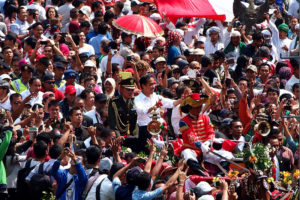
Image Credit Kreshna Aditya
The government’s interventions were largely ineffective, however. Instead of the 60% Jokowi had aimed for, the president attained 55.5% of the vote—only about 2% more than in 2014, when he had gained 53.2% without the help of the bureaucracy, security forces or the media (the media at the time largely sided with Prabowo). Moreover, despite his massive presidential campaign to win over West Java and Banten, Jokowi actually lost ground in those key provinces. This outcome suggests that incumbent presidents are mostly unable to engineer elections across Indonesia’s vast territory and complex political landscape, which is great news for Indonesia’s electoral democracy. Notwithstanding the fact that Jokowi’s opponent ran on a populist platform and mobilised various anti-democratic appeals, the president’s failure to secure a nationally balanced increase in his vote is testimony to the Indonesian polity’s resistance to electoral coercion.
The source of this continued strength in Indonesia’s electoral democracy is multi-layered elite competition, drawing upon and seeking to control widely dispersed patronage systems. Participants in these systems resist efforts at recentralisation: even if they can gain access to resources by backing more senior patrons (hence the formal support shown for Jokowi), they risk election loss if they turn their backs on their local bases. Ultimately, the vested interests of grassroots elites competing for power at the local level generally trumped the pressures that they experienced from central campaign machines trying to impose national directives.
In sum, the outcome of the 2019 elections emphasised why Indonesia has not (yet) crossed the line to become a non-democratic regime. The pillars of Indonesia’s electoral democracy are still solid, with the incumbent president being structurally prevented from organising the overwhelming victory he so keenly sought. But while electoral democracy’s minimum criteria of freeness, fairness and competitiveness in elections are clearly met in Indonesia’s case, there are signs of democratic weakness even in the electoral arena. The very reason for continued electoral competitiveness—the highly dynamic competition between elites for patronage resources—is also an indicator of major structural defects. ‘Competitiveness’ in the Indonesian context primarily means intra-elite contestation—and while that is intense, it largely shuts out non-elites who cannot afford to participate in the country’s increasingly expensive elections. Moreover, while the attempts of the incumbent government to use its state powers for electoral interventions were mostly ineffective and thus did not damage electoral democracy per se, they severely undermined non-electoral aspects of the democratic fabric.
Democratic regression: Islamism and executive illiberalism
Despite Indonesia’s resilience in retaining its status as an electoral democracy, the quality of this democracy has declined considerably in recent years—including during the 2019 election year. It is important to emphasise the distinction between democratic decline and democratic reversal. In the Indonesian context, this means that highlighting democratic regression is not equivalent to arguing that the democratic polity has returned to its pre-1998 status as an authoritarian regime; it simply asserts that the current level of democratic quality is lower than its previous high point. Put differently, Indonesia’s democracy stopped progressing at a certain point and subsequently began to retreat.
At the core of Indonesia’s democratic regression is an anti-democratic campaign by Prabowo’s populist–Islamist alliance, combined with the Jokowi government’s conviction that it had to launch repressive measures against it in order to protect Indonesia’s pluralist constitution. While populist and Islamist leaders carry much responsibility for producing the anti-democratic agenda that unsettled the post 1998 status quo, they were later—ironically but not without justification—able to portray themselves as victims of government-led repression, intimidation and engineering. This was because of a series of actions by the Jokowi government that amounted to a systematic operation of ‘executive illiberalism’. This campaign was designed to contain the threat that the rising populist–Islamist coalition could destroy Indonesia’s post-Soeharto democracy and its pluralist orientation, but it had the effect of deepening Indonesia’s democratic crisis
These suppressive attempts by Jokowi’s government damaged specific aspects of Indonesia’s democracy—regardless of the fact that they did not move the electoral needle much and thus did not reduce the polity’s competitiveness. But the criminalisation of political opponents undermined the police’s crucial role of neutral law enforcement; the political streamlining of the television media reduced the already limited availability of critical information for citizens to make informed choices; the politicisation of the military for electoral mobilisation set back the efforts of two decades to extract the military from politics; and the attempted political involvement of bureaucrats blurred the line between democratically elected politicians and the administrators working for them. Moreover, these reductions in democratic quality added to equally concerning trends in other arenas of democratic organisation.
Decline of the parties
Patterns of democratic decline in Indonesia were particularly starkly illuminated by trends in the country’s party system. Robust political parties are a critical, albeit frequently underappreciated, ingredient of a high-quality democracy. The 2019 legislative election was a further milestone in the long-term weakening of Indonesia’s political parties and their influence on electoral competition on the ground. The trends of 2019 did not mark a dramatic break with those of the past, since party decline has been apparent over several electoral cycles. But it helped to illustrate the core problem: the increasing personalisation of electoral competition and the resulting marginalisation of parties in Indonesia’s democratic system.
The roots of this problem can be traced back to 2009, when Indonesia made the transition to a fully open-list proportional electoral system. In such a system, voters can choose between marking their ballot paper in favour of a party or one of the candidates of that party in the voter’s district. Crucially, the candidate(s) with the most personal votes win(s) the seat(s), should the party and its candidates combined win enough votes to secure one or more seats. This transition dramatically transformed the nature of electoral competition: it shifted the main axis of competition from being between parties to being between candidates from the same party. The results were both predictable and keenly felt. Instead of promoting their parties’ platforms and visions—which would not differentiate them from their intra-party rivals—candidates expended their energy and funds on building personal networks and campaign teams, known as ‘success teams’ (tim sukses), and promoting their personal brands to voters. They often did so by providing cash, gifts of various sorts and community donations either to individual voters or to communities.
The 2019 legislative election confirmed—and accelerated—developments that had been increasingly apparent over several electoral cycles, especially since the introduction of open-list voting in 2009. These developments included the increasing personalisation of campaigns, the ensuing soaring costs of running for office (borne by individual candidates rather than parties), and the resulting advantages enjoyed by wealthy and powerful local elites as candidates. These trends encourage corruption and the elite capture of parties, because winning candidates have strong incentives to recoup their campaign costs from office and parties are increasingly used as vehicles for personal ambitions rather than social or political missions. This combination undermines Indonesia’s democratic quality—in no small part because it drives political alienation and fuels support for anti-system candidates such as Prabowo. Certainly, during his 2019 election campaign, Prabowo returned to familiar themes from 2014, excoriating the corruption and self-serving nature of the political elite. Putting aside the boldness of this critique (Prabowo is himself a leading oligarch, while his party engages in money politics at least as brazenly as its rivals), the strength of Prabowo’s appeal reflects in part popular alienation from the existing political system.
Deepening polarisation
Yet another paradoxical feature of Indonesia’s political experience in 2019 was that the organisational fragmentation of the parties, which slows the executive’s instrumentalisation of the state apparatus, was unable to check deepening electoral polarisation along socioreligious lines. Since the 2014 elections, and especially since the anti-Ahok mobilisations of 2016–17, the political cleavage separating pluralists and Islamists has deepened appreciably. While competition between these two groups has been a feature of Indonesia’s political landscape since the country became independent, it has intensified under Jokowi, with his pluralist supporters and Islamist opponents increasingly locked into what many of the protagonists view as a zero-sum competition.
Indonesia’s pro-democracy protests cut across deep political cleavages
Bipartisanship and problems of representation in Indonesian politics.
Accordingly, the election campaign was conducted in a climate of acute sociopolitical alarm, with supporters of each side painting their opponents as existential threats to themselves and their vision of Indonesia. In Christian and other majority-minority areas, supporters of Jokowi told voters that a victory by Prabowo would herald the establishment of an Islamic state or even an Islamic caliphate. NU leaders in East and Central Java, meanwhile, warned their followers that radical groups such as HTI were behind Prabowo’s campaign, and that if they won, NU’s traditional religious practices would be under threat, as would NU’s vision of an inclusive ‘archipelagic Islam’, and the Pancasila-based state itself. Similarly, among Prabowo’s Islamic supporters wild rumours of conspiracy spread—not only the usual (false) allegations that Jokowi was secretly Chinese or Christian but also allegations that he had plans to ban the use of loudspeakers forthe Muslim call to prayer, to legalise same-sex marriage, and to smuggle millions of Chinese into the country in order to displace Indonesian workers and cast votes in the election.
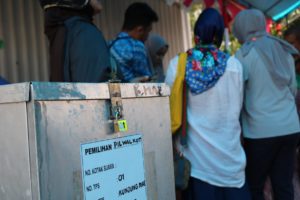
Image Credit Herwin Bahar
Clearly, this socioreligious polarisation is related to the process of democratic decline. It helps motivate and justify both the executive illiberalism that we discussed above and the Islamist mobilisation against pluralist democracy. In addition, it helps to undermine democratic discourse as a fundamental element shaping political competition, including in elections. In 2019, the socioreligious cleavage almost completely overshadowed the democratic cleavage that had at least partially shaped the 2014 campaign. At that time, some of Jokowi’s supporters had viewed his candidacy as a means to deepen Indonesia’s democracy and prevent the election of Prabowo, who some believed would revive authoritarian rule. With many of these same supporters now prioritising the defence of pluralism against an assertive Islamism, in 2019 they applauded the Jokowi government’s measures against HTI, Habib Rizieq and other Islamist opponents. Many of Prabowo’s supporters, meanwhile, rejected the election result itself, violating what is arguably the most basic norm of democratic rule: that elections should determine the allocation of political power.
Conclusion: Beyond normal politics
The distinctive feature of the past five years is that the government has grafted on top of these chronic problems of Indonesian democracy, a series of deliberate and purposeful actions—which we have described collectively as executive illiberalism—to undermine democratic protections and liberal norms, primarily in order to achieve its goals of constraining opposition and securing re-election. Partly motivating these actions, and justifying them in the eyes of officials and supporters alike, has been a mounting sense of siege linked to socioreligious polarisation, and the belief among Jokowi supporters that the ambitions of Islamists must be kept in check. In the aftermath of the elections, despite ritualistic affirmations of the need for reconciliation, there were plenty of signs that this underlying political logic will remain unchanged—for example, it emerged that the government was planning a significant purge of Islamists from at least the senior echelons of the public service.
When we argue that Indonesian democracy is regressing, it is this confluence between systemic weakness from below and deliberate erosion from above that draws our attention. The systemic weakness has been a feature of Indonesian democracy since the time of Indonesia’s democratic transition—prompting much focus in early post-Soeharto literature about the unfinished nature of Indonesia’s democratisation and the high level of elite continuity connecting the democratic era to the preceding authoritarian regime. It has been a broadly shared consensus among specialists on Indonesian politics that Indonesia stopped making progress in overcoming systematic weaknesses some time during the Yudhoyono presidency. Under Jokowi, stagnation gave way to regression as the government responded with executive illiberalism to the challenges of governing, especially in response to the Islamist mobilisations of 2016–17. The government no longer struggled to keep pushing democratic reform forward; it began to take deliberate and concerted efforts to reduce democratic space. This is an important warning sign for Indonesian democracy: as numerous observers of global trends have pointed out, so-called ‘executive takeover’ is the ‘modal form’ of democratic decline in the contemporary world, displacing coups and other forms of violent overthrow.
However, we need to take care in describing this trend. By stating that Indonesian democracy is experiencing regression, we are not arguing that the country is heading back to a reconstituted version of old-style Soeharto-era authoritarianism, nor that Indonesia has dropped below the threshold of electoral democracy. The measures taken by the government to restrict opposition have been limited—there has been a small number of targeted arrests of government critics, rather than a mass crackdown on opposition. Distinguishing Jokowi from electoral authoritarian leaders such as Hungary’s Viktor Orbán or Turkey’s Recep Tayyip Erdoğan, checking institutions, such as the Constitutional Court, remain largely independent in Indonesia.
Most importantly, the robustness of the 2019 elections—including Jokowi’s failure to secure the overwhelming victory he had so clearly desired—point to the strong elite competitiveness that continues to undergird electoral democracy in Indonesia, while simultaneously constraining its scope. Jokowi himself remains committed to electoralism: when some of the parties that had supported Jokowi’s re-election proposed reinvigorating the role of the People’s Consultative Assembly (MPR)—the body that had periodically ‘elected’ the president during the Soeharto years—Jokowi spoke strongly against the idea and in favour of direct elections, stating proudly that he himself is a product of this system. The events of 2019 thus demonstrated that the core electoral pillar of Indonesia’s democracy remains relatively strong, even as the system of democratic rights and norms that are essential to democratic quality is slowly being eroded.
 Facebook
Facebook  Twitter
Twitter  Soundcloud
Soundcloud  Youtube
Youtube  Rss
Rss 